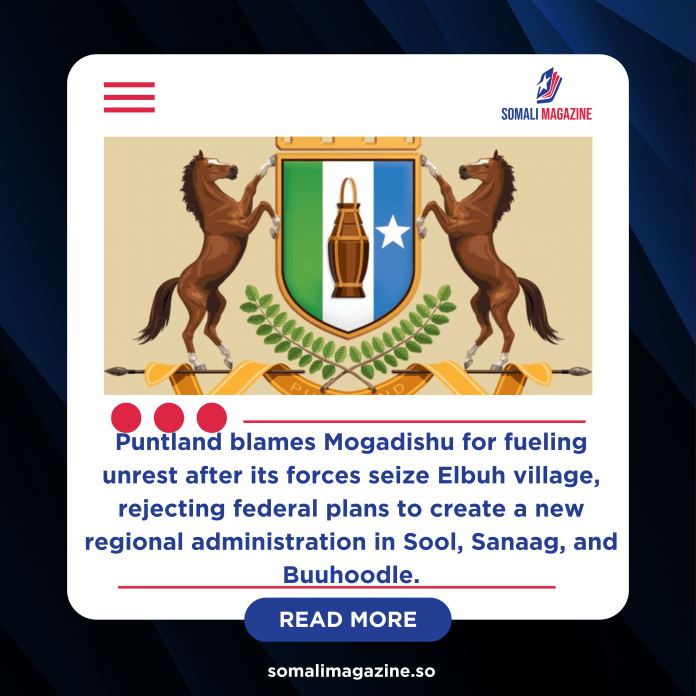Facebook Twitter (X) Instagram Somali Magazine - People's Magazine
Puntland has warned Somalia’s federal government that it will be held responsible for any violence that breaks out in the disputed Sanaag region, after Puntland forces took control of Elbuh, a small coastal village. The move came amid growing tensions over who should govern parts of northern Somalia.
The takeover of Elbuh happened late Saturday night when Puntland troops entered the area and forced several political figures aligned with the federal government to leave. Among them was Abdirashid Yusuf Jibril, a former Puntland parliament speaker. Puntland officials say Jibril was planning a meeting in support of integrating the Sanaag region into a different local administration known as SSC-Khaatumo, which is not recognized by Puntland.
According to Puntland authorities, Federal Minister of Commerce Mahmoud Ahmed Adan, also known as Geesood, had planned to visit Elbuh on Saturday. However, he reportedly canceled his visit after Puntland troops moved into the area. Puntland accuses Geesood of working with the federal government in Mogadishu to destabilize the region by supporting efforts to form a new administration outside Puntland’s control.
At the heart of the issue is a plan by the Somali federal government to merge three disputed regions—Sool, Sanaag, and Buuhoodle—into a single federal-aligned administration. Federal officials argue that this move would help reduce clan tensions and allow for better delivery of services to the local people.
However, Puntland strongly opposes this plan. Leaders in Garowe, the capital of Puntland, say the three regions are historically and constitutionally part of the Puntland state. They believe that creating a separate federal administration would not only violate the constitution but also increase the risk of violence in an already unstable area.
The regions in question are part of a strategic area in northern Somalia. They sit at the crossroads between Somaliland, Puntland, and Ethiopia’s Somali region. Because of this, the territory is often at the center of political disputes and occasional fighting. There is also a high level of al-Shabab activity in the area, making the security situation very fragile.
This is not the first time the federal government has tried to redraw regional boundaries. Similar efforts in the past have led to political boycotts, armed conflict, and worsening relations between Mogadishu and regional states like Puntland.
Puntland leaders say they are ready to protect their territory and will not allow any other political group to interfere in what they see as internal matters. They have called on the federal government to stop what they describe as attempts to divide Puntland and weaken its authority.
On the other hand, officials in Mogadishu argue that their plan is about building a stronger and more inclusive federal system. They say the creation of a new administration in the Sool, Sanaag, and Buuhoodle areas would help bring peace and end long-standing tribal disputes.
As the standoff continues, the people of the disputed regions remain caught in the middle. Many are concerned that the growing political tension could lead to fighting and further instability. Community leaders and observers have urged both sides to seek dialogue and avoid taking steps that could lead to violence.
In summary, the power struggle between Puntland and the federal government over the Sanaag region highlights ongoing issues in Somalia’s federal system. With fragile security and unresolved political disagreements, the situation remains tense and unpredictable.

